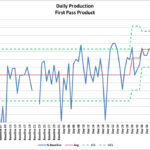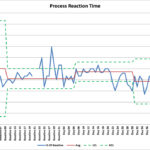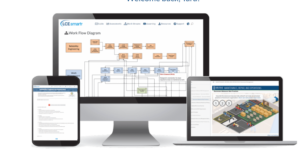Reliability_Engineering_Drives_Production_for_Chemical_Plant
One of the world’s leading chemical treatment companies, specializing in industrial applications, recently installed a new production unit within their chemical plant. The unit was designed to propel the supplier into their market as the low-cost leader. However, operational challenges were preventing them from achieving this goal. The combination of new process technology and the plant’s reactive practices were driving product costs higher than originally planned. Site maintenance and reliability procedures were causing an inconsistent production rate of volume leaving much room for improvement if they were to become the low-cost leader.
Partnering with LCE to create change
To improve their production levels and become the low-cost leader, the plant needed to institute change within their plant. To help facilitate change, the plant teamed up with Life Cycle Engineering (LCE), a leader in change management and reliability consulting, to conduct a full review of their operational processes. LCE began the path towards change with a comprehensive assessment that examined process design, plant equipment, management practices, and spare parts housing.
Together, LCE and plant leaders identified three high-level goals that would need to be accomplished to achieve success:
1. Stabilize workflow and production unit processes
2. Establish work management processes
3. Identify and organize spare parts inventory
Assessing production and process performance
After completing the assessment, LCE and plant site teams quickly went to work with a unified vision for change. To address the inefficiencies within the plant’s workflow and production unit processes, LCE assigned a diverse team of reliability engineers and technicians to review various areas of the plant. This group would go on to assess the production unit design, gain control of the equipment, stabilize the process, and identify and repair issues causing volume and rate losses, all while maintaining zero injury performance.
After conducting a thorough end-to-end design review of the plant’s new processes and equipment, Reliability Engineering Subject Matter Experts (SMEs) formed a top 10 list of needed improvements, procedures for implementing a failure modes and effects analysis (FMEA), risk plan, operating plan, and a maintenance plan in order to ensure a consistent rate of production volume.
The teams continued to institute change by assigning reliability technicians to conduct physical walk-downs of the processes and equipment to confirm asset locations, population count, and name plate data. Spare parts and materials left over from previous construction were consolidated and the physical inventory was stored in a newly developed storeroom that would greatly reduce downtime while improving work order management.
Achieving success with reliability engineering
The most comprehensive activity was the engineering review and the subsequent creation of risk, operation, and maintenance plans. This review led to the aforementioned top 10 list of needed improvements, which comprised undersized equipment, operating process conditions that were not within design specifications, and missing instrumentation. Reliability technicians developed equipment maintenance plans and BOMs for critical equipment, while correcting equipment master data and hierarchies.
LCE incorporated Risk-Based Asset Management (RBAM) to maximize the lifetime value of each asset. RBAM applies logical asset hierarchy, objective criticality analysis, prioritization control strategies, and systematic performance monitoring to sustain the highest level of asset reliability, maintainability, and life cycle cost for the business. The following table represents the results achieved by implementing the RBAM program.
| Hierarchies Created |
160 |
| Added Equipment to CMMS |
150 |
| Spare Parts Catalogued |
350 |
| Top Critical Equipment Maintenance Plans |
10 |
| PMs for Top Critical Equipment |
30 |
Product volume increased 33% through a combination of equipment modifications, attention to daily operating details, incremental process improvements, and communication. The site began measuring process capability and variation as shown in the graph below.

The site was able to see significant improvements in their overall production volume. They were able to increase batch fill percentage over 5% from baseline and reduce processing time by 6% from baseline. The reduction in variability in batch fill and processing time, coupled with increased equipment reliability, enabled a 7% increase in process start average each day.
The chart below depicts the reduced variation, proving tighter control over the unit process. The upper and lower limits (green dashed lines) represent +/- 3 sigma. The range in variability was reduced 65%.

To conclude, after seven weeks of focused and aligned activities, the client achieved improved stability and process capability. The client solution required several different elements: a design review, reliability-based asset management support, business process consulting, goal alignment, and communication. The improvements were a direct result of the partnership between LCE and client site personnel to engage in identifying, quantifying, and resolving the right technical and operational processes.
Additional Information
For more information about improving operational and financial performance, please email us at info@LCE.com or visit www.LCE.com .
About LCE
Life Cycle Engineering (LCE) (www.LCE.com) provides consulting, engineering, applied technology and education solutions that deliver lasting results for private industry, the Department of Defense and other government organizations. The quality, expertise and dedication of our employees enable Life Cycle Engineering to serve as a trusted resource that helps people and organizations to achieve their full potential. Founded in 1976, LCE is headquartered in Charleston, South Carolina with offices across North America and experience around the globe.
Contact Us
Corporate Headquarters
Life Cycle Engineering
4360 Corporate Road
Charleston, SC 29405-7445
843.744.7110
info@LCE.com
















